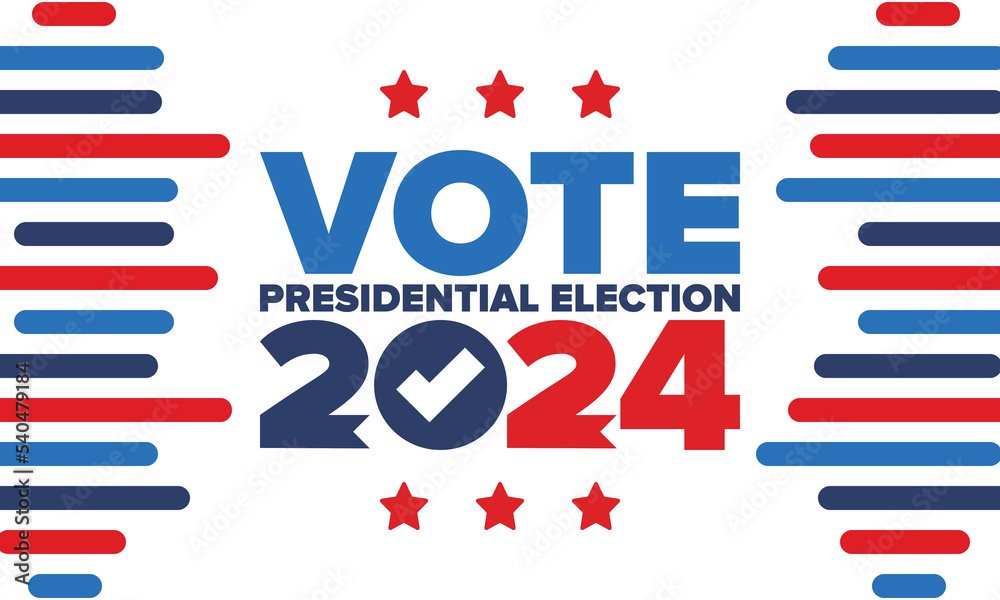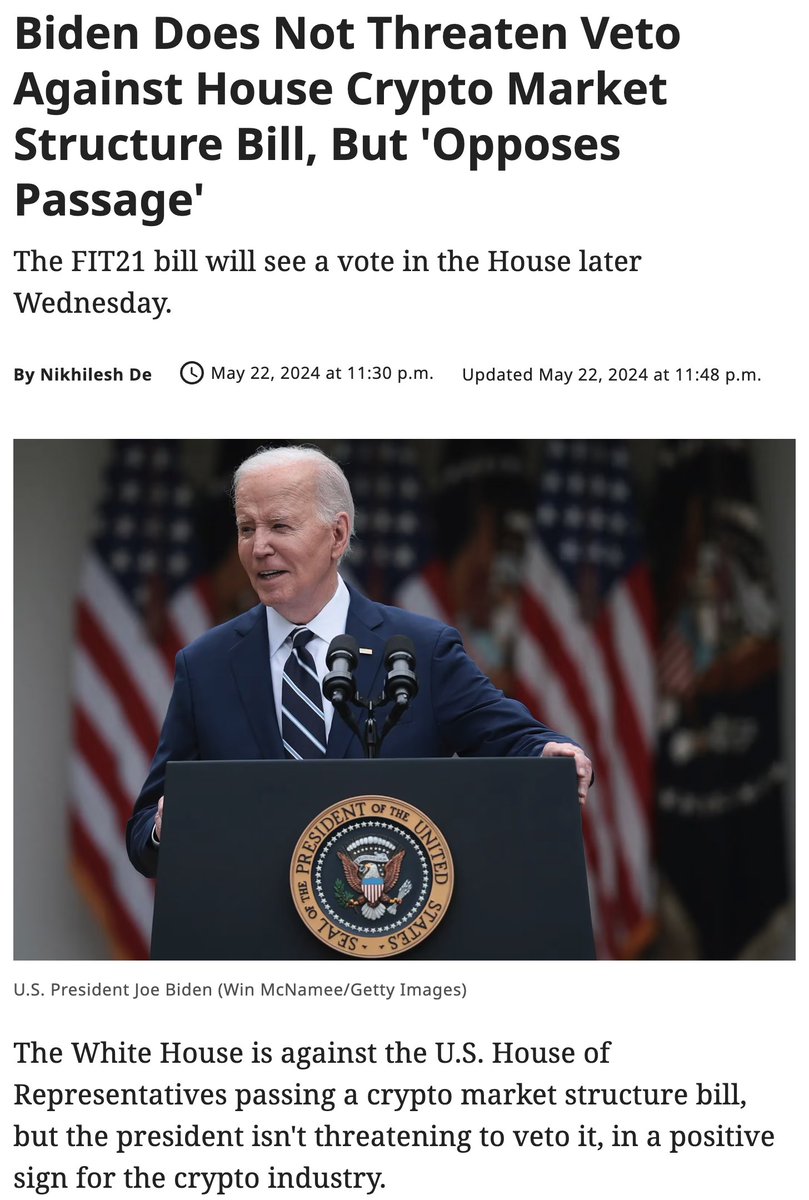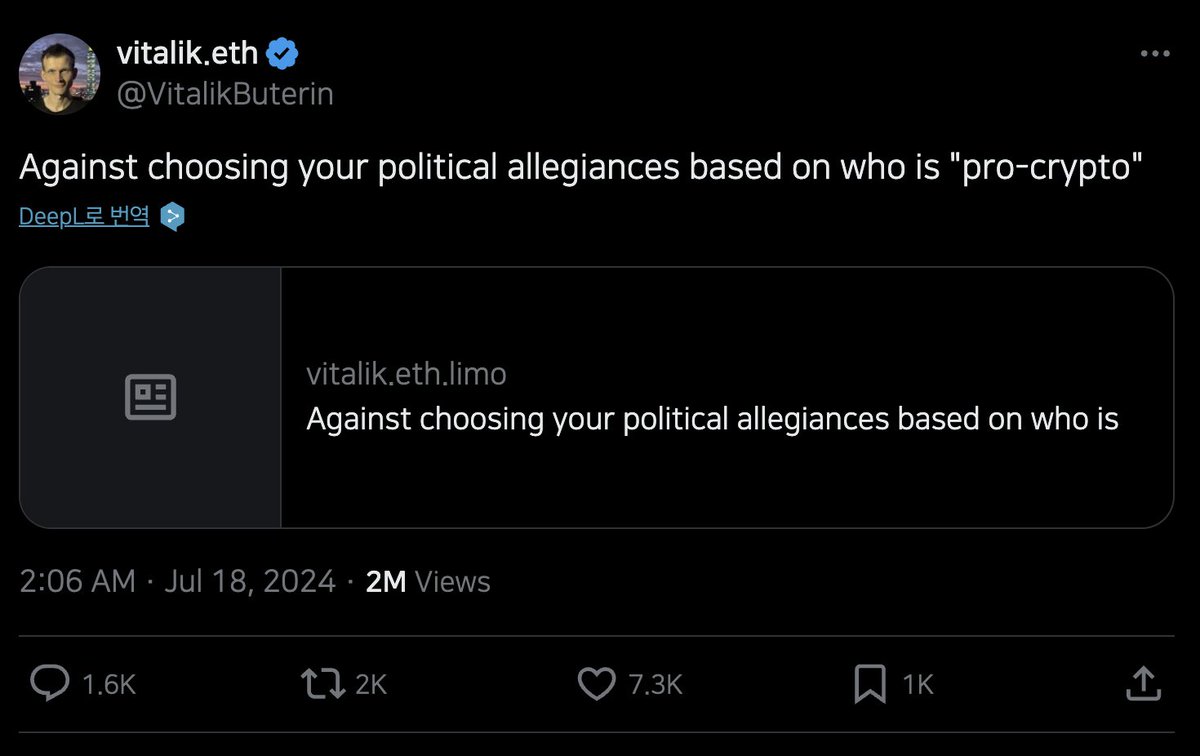
Source: Adobe Stock, scoutori
A globally stirring event is approaching: the U.S. presidential election. The U.S. presidential election, to be held on November 5, 2024, will be the 60th presidential election in the United States. As of July 19, the Republican candidate, former President Donald Trump, and the Democratic candidate, incumbent President Joe Biden, are in a fierce contest. (As of July 22, note that Joe Biden, who was the Democratic presidential candidate, has withdrawn from the candidacy.)
Various industries are closely watching the outcome of this election, and the blockchain industry is no exception. This is because the candidates from each camp have differing attitudes towards cryptocurrencies. Generally speaking, Joe Biden, who was running for re-election from the Democratic camp, originally had an anti-cryptocurrency stance, exercising veto power against cryptocurrencies. On the other hand, Donald Trump from the Republican camp is known for his pro-cryptocurrency stance, raising funds through cryptocurrencies and attending Bitcoin conferences. However, it should be noted that this year, Biden's side has shown a more conciliatory approach, indicating that cooperation with Congress on these issues is necessary.

In this crucial election, which could determine the direction of the United States and, to some extent, the world, the topic of cryptocurrencies has become a mainstream issue, prompting numerous opinions from various quarters. Notably, Vitalik Buterin, who arguably has the most significant influence in the current blockchain industry, published a blog post titled "Against choosing your political allegiances based on who is ‘pro-crypto’" on July 17. This post has sparked considerable discussion, with the corresponding tweet on platform X reaching approximately 2 million views and being retweeted over 2,000 times, causing a significant ripple effect.

In the article, Vitalik argues that when determining political beliefs, it is unwise to base decisions solely on whether a candidate supports pro-cryptocurrency policies. He asserts that such judgments risk undermining the core values of cryptocurrencies. Instead, individuals should ensure that a politician's overall vision and values align with their own. Vitalik emphasizes that the fundamental goals of cryptocurrencies are to protect individual rights through freedom and decentralization. Merely highlighting the freedom to trade cryptocurrencies misses this objective. He stresses the importance of carefully examining whether a politician's stance on cryptocurrencies supports freedom and internationalism or merely seeks power.
Vitalik's article has sparked a significant discussion about cryptocurrencies and politics. This discussion, or agora, includes a range of opinions from the author and other prominent figures in the blockchain industry. Let's delve into these perspectives.
As a citizen of South Korea, I would like to clarify that my direct connection to the U.S. presidential election is limited. Therefore, I have focused primarily on the political issue of cryptocurrencies and Vitalik's opinion, excluding other American political issues.
Firstly, I agree with Vitalik's opinion that we should question the "sincerity" of politicians' views on the blockchain industry, whether those views are personal opinions or party agendas. Politics is essentially a process of gathering opinions to determine the direction a community, which is entangled with myriad interests in numerous fields, should take. In the representative democracies that many countries currently adopt, voting is the most prominent method of opinion gathering. Thus, if a topic seems likely to garner votes and stir up issues in the short term, politicians can easily get swept up by it. Consequently, even those with a pro-cryptocurrency stance may conduct superficial background checks and implement hasty policies and regulations, which can adversely affect the blockchain industry.
Vitalik is concerned that politicians are focusing not on the fundamental philosophy of cryptocurrency and blockchain but on the monetary aspect and the freedom of transactions. He worries that this focus neglects the intrinsic values of the industry. Reflecting on South Korea, I can recall instances during parliamentary, local government, and presidential elections where policy and regulatory stances changed as easily as flipping a switch. This experience makes me sympathize with Vitalik's perspective.
On the other hand, the part of Vitalik's opinion that I find difficult to agree with is his apparent disregard for the "positive functions" of politics, viewing it solely from a cryptocurrency perspective. Politics is often described as a living organism, meaning it can change at any time and respond immediately to numerous variables. The head of this political organism, the politician, gauges and responds to what the majority of the community desires. The way to make politicians aware of an issue is straightforward: voice opinions and vote, whether in support or opposition. If this increases interest in and infrastructural development of the related industry, it is a positive function of politics.
In particular, the political confrontation between pro-cryptocurrency and anti-cryptocurrency stances triggered by this election has significantly increased interest in the blockchain industry. Therefore, I find it hard to agree with the opinion that denies the actions of supporters who raised their voices in favor or opposition.

The paradox lies in my agreement and disagreement with Vitalik’s views. While political interest is necessary for improving awareness and advancing the cryptocurrency industry, such interest might stem from mere opportunism rather than a deep understanding of cryptocurrencies. Ideally, well-informed policies and regulations would follow the initial interest, but achieving such a balance is challenging. Just as one must scratch a lottery ticket to win, supporting pro-cryptocurrency factions or individuals is essential for the development of the cryptocurrency and blockchain industry. Naturally, supporters must also remain vigilant, continuously questioning and monitoring to ensure that these politicians genuinely advance the cause of cryptocurrencies rather than discarding the issue after securing votes.
Firstly, there are several flaws in Vitalik’s argument. The first is that most people vote based on a single issue that directly affects their livelihood, rather than all the issues addressed by politics. This is not a matter of right or wrong but human nature. If we believe that granting voting rights to all citizens through democracy is correct, we must also accept how they choose to vote. For citizens to vote based on the overall political landscape as Vitalik suggests, 1) they would need education to understand all policies, and 2) they would require sufficient time and economic resources to evaluate these policies. How many citizens can truly do this? This is a very naive thought. Unless Vitalik advocates for plutocracy, his argument is impractical regardless of its correctness.
Secondly, while the Trump administration may have policies that contradict crypto/blockchain principles, there are also many that align with them. Vitalik’s claim that crypto supports internationalism is debatable. In fact, crypto can be seen as supporting non-interventionism and pacifism, which aligns with the Trump administration’s international political agenda. To think that crypto aligns with internationalist foreign policy simply because it is a global asset and blockchain has no borders is also naive. I believe Bitcoin and blockchain emerged as a reaction against active U.S. foreign intervention.
In summary, we should not overlook that politics is fundamentally linked to livelihood for the general public, leading to the likelihood of single-issue voters. The notion that Trump’s policies are more contrary to crypto than Biden/liberal policies is arguable. Moreover, Trump’s non-interventionism aligns with the pacifism championed by crypto, making it not contradictory for crypto advocates to support Trump.
I believe that Vitalik fundamentally misunderstands the realpolitik on how most politicians pick their policies. Policy choices are rarely based on some deep beliefs they hold, they pick policies based on what will win them elections.
When Vitalik asks "are they in it for the right reasons" in his post, I think that's an impossibly high bar. If a politician supports the policies I like because they think it will help them win elections, that's fine by me. I don't expect politicians to be loyal to any policies if those policies become unpopular later.
In my opinion the job of a politician is to reflect the will of their constituents, not to "be in it for the right reasons".
Overall this was a good post from Vitalik who I respect as a thinker. And while I disagree with his view on how politics work, I do share his anti authoritarian values and think we both want the same political outcome. We just disagree on how we get there.
(The following is a summary of what we've seen, so please refer to the links in the reference to see it all).
Vitalik recently published a blog post entitled “Against choosing your political allegiances based on who is ‘pro-crypto.’” He argues that supporting politicians solely based on their pro-crypto stance is shortsighted because it ignores broader principles like privacy, internationalism, and decentralization that underlie the Cypherpunk movement and the creation of cryptocurrencies.
In my opinion, Vitalik is wrong in three key areas.
Privacy - Vitalik highlights the importance of privacy-preserving technologies beyond cryptocurrency. However, in practice, no politician supports these privacy technologies while opposing crypto. The state has a natural incentive to reduce privacy for greater control and security. Thus, a politician's stance on crypto serves as a proxy for their stance on privacy.
Internationalism - Vitalik advocates for a global perspective in politics, but elected officials have a duty to prioritize their own nation’s interests. While internationalism is a noble goal, it is impractical in national politics. Politicians are bound by oaths to support their country above all others, making it unreasonable to expect them to champion internationalism.
Decentrailzation - Vitalik discusses the importance of decentralization, especially regarding AI. The reality is that politicians who support crypto are also likely to support decentralized AI. For instance, the Biden Administration's recent executive order on AI imposes constraints that hinder small tech companies, showing an anti-decentralization stance. The principles of decentralization underpin both crypto and small tech, making it unlikely for politicians to support one without the other.
Vitalik is a respected thinker, but his blog post exhibits confusion at a crucial time for crypto's integration into the global financial system. Progress requires engagement with the existing political system and clear allegiances. While there may be valid reasons to avoid supporting today's pro-crypto candidates, Vitalik’s stated reasons are flawed.
In an open and free democracy, the only right motive in politics is to represent the people, aka pander to voters. Make the voters care about the right reasons, privacy, freedom, etc… and the politics will reflect it.
Related Articles, News, Tweets etc. :
Dive into 'Narratives' that will be important in the next year